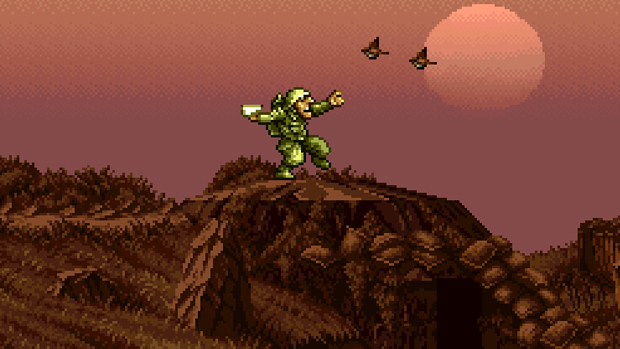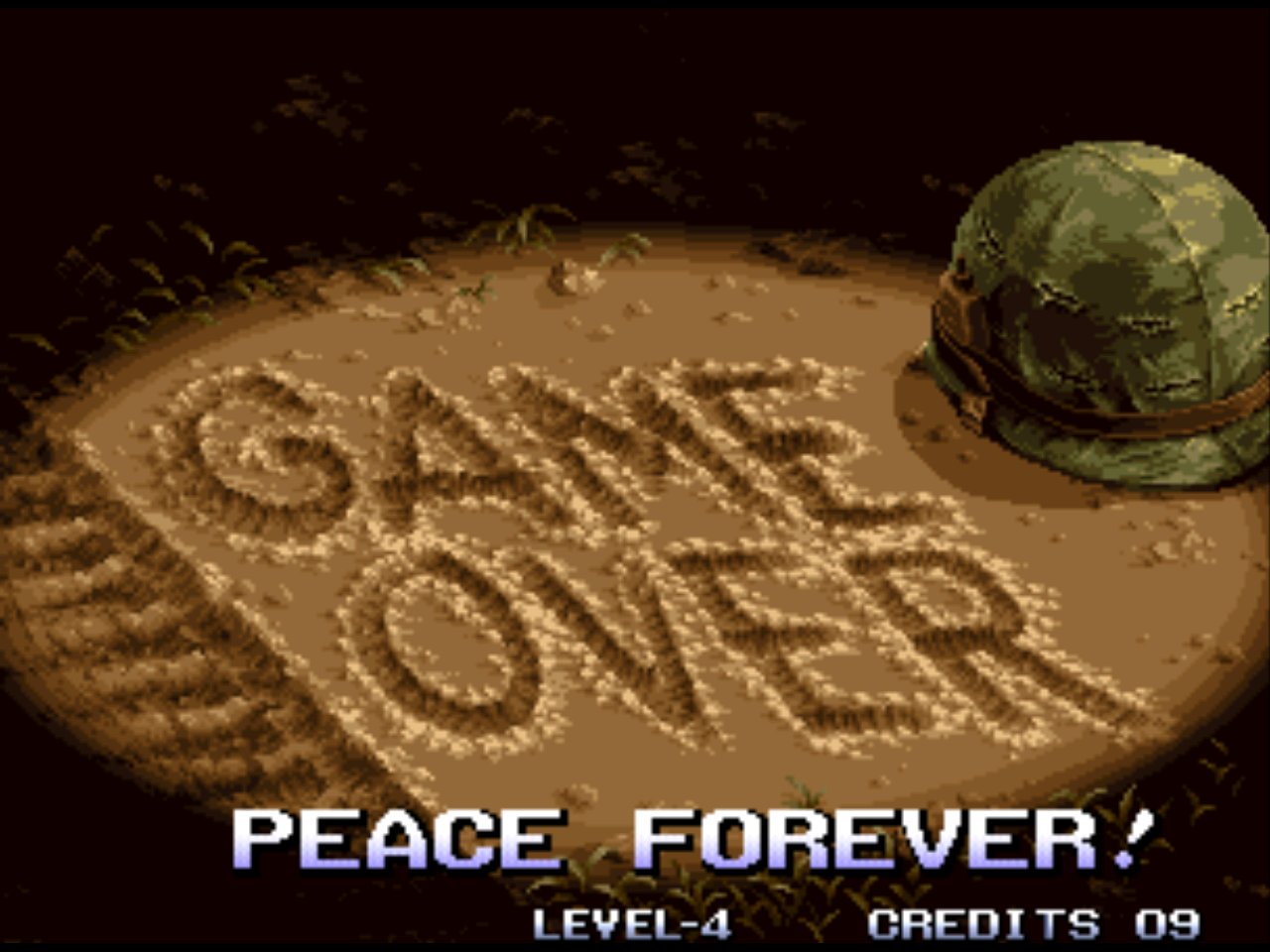Why I Love: Metal Slug's surprisingly somber ending

For my money, Metal Slug reigns supreme as the best 2D shooter series of all time, Contra included. I can trace my love for SNK's run-'n'-gun classics to the original game, which I first encountered in one of those four-slot Neo-Geo arcade cabinets, tucked away in a little corner at the local ice rink. I was enraptured by Metal Slug's absurdly smooth animations, crisp, explosion-filled pixel art, incredibly steep difficulty, and the sheer noisiness of the artillery that's constantly being fired into enemy soldiers, all of whom howl in pain when you eviscerate them with a hail of HEAVY MACHINE GUN bullets. Over the years, I would play Metal Slug and its sequels to completion countless times - but none of them end quite like the first.
It's total tonal whiplash, and I love it. You've just spent the past 40-odd minutes frantically blasting through waves of green-clad soldiers loyal to the Saddam Hussein-lookalike General Morden, utilizing everything from flamethrowers and bulbous-looking tanks to your trusty pistol and close-combat knife. Making it to the end of the game requires a laser-like focus and/or cargo pants pockets brimming with quarters, as you rush to incapacitate legions of cannon fodder and impossibly large warmachine bosses before they can kill you in a single hit. By now, Marco and Tarma have taken down enough goons to make Rambo look like a stumbling toddler. And after thousands of close calls and spent clips, you've managed to take down Morden's decked-out chopper and bring a temporary end to your personal war. You'd expect nothing less than a 24-bit parade in your honor for the valiant mission you've just completed.
Instead, we cut to a lone enemy soldier, fiddling with a piece of paper; he folds it up into a simple paper airplane and throws it with the wind. We watch it glide peacefully as it soars over the ruins of the warzone you just plowed through, now bathed in the pink light of the setting sun. The destroyed husks of tanks, battlefield crosses of helmets resting atop rifles, the corpses of soldiers who have yet to be buried - the paper airplane floats to and fro above it all. Seemingly carried by magical jet stream, the plane manages to backtrack through every level, reminding you of everything you fought through to get here. All the while, the game's theme song has been triumphantly playing with drums and trumpets blaring; slowly, it gives way to the strings of a harp and a much softer melody. We see birds soaring through the air, a rainbow shining through the iconic waterfall where the first boss fight took place. A young woman mourns at a soldier's grave, flowers draped around a familiar green helmet. Eventually, the paper airplane drifts into the horizon of the night sky until it's but a twinkle in the distance, ostensibly floating on forever as "FIN" caps off the rolling credits.
My god, what a brilliant turn to take. In a game where the most memorable bits of dialogue are lines like "MISSION START" and "ROCKET LAWN-CHAIR", the ending - which could've been a complete throwaway like so many other arcade games - actually makes you stop and think. You suddenly recall all the heart-stamped letters and children's dolls dropped from the bodies of your enemies, which you hurriedly scooped up for some additional points. Maybe you don't break down into tears and cry out in anguish at the atrocities your digital commando has committed, but you pause to consider the enemy perspective, which is something few games even attempt, let alone manage, to do.

Other Metal Slug endings are great; I'm particularly fond of Metal Slug 3's shot of your character's pistol slowly sinking to the bottom of the ocean. But even though Metal Slug's idle animations and exaggerated death screams are purposely hilarious, the decision to go with a somber ending still feels so right to me. The series hadn't yet delved into the explicitly supernatural, with enemies like those tentacled Martians and blood-spewing zombies popping up in later games. So there's something extra powerful about infusing some humanity into all the soldiers you killed on your path to the high score screen. When it's all said and done, the standard Game Over screen pops up, but with a new, uplifting message at the bottom: "Peace Forever!"
And amazingly, the ending is even greater than I remembered. To my discredit, I'd only ever played Metal Slug all the way through on my own - and now, years after beating the game for the first time, I've learned that the tone of the ending changes completely if you finish the game in two-player co-op. The paper airplane camera shot is the same, but the scenes it flies over are all peaceful and charming vignettes instead of a procession of the harsh consequences of war. It's also accompanied by some incredibly upbeat music, which even got a glorious vocal version on the PS1. I don't know how to process this revelatory new info yet; perhaps by playing together with a friend, you're inherently promoting the peace that the ending longs for. But one thing's for certain: the mere fact that I still think about the ending to a 1996 arcade game speaks volumes of its masterful execution. I love both Metal Slug and what it stands for, even though those things seem to be completely at odds with each other.
Sign up to the GamesRadar+ Newsletter
Weekly digests, tales from the communities you love, and more
Lucas Sullivan is the former US Managing Editor of GamesRadar+. Lucas spent seven years working for GR, starting as an Associate Editor in 2012 before climbing the ranks. He left us in 2019 to pursue a career path on the other side of the fence, joining 2K Games as a Global Content Manager. Lucas doesn't get to write about games like Borderlands and Mafia anymore, but he does get to help make and market them.



